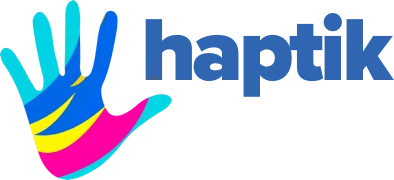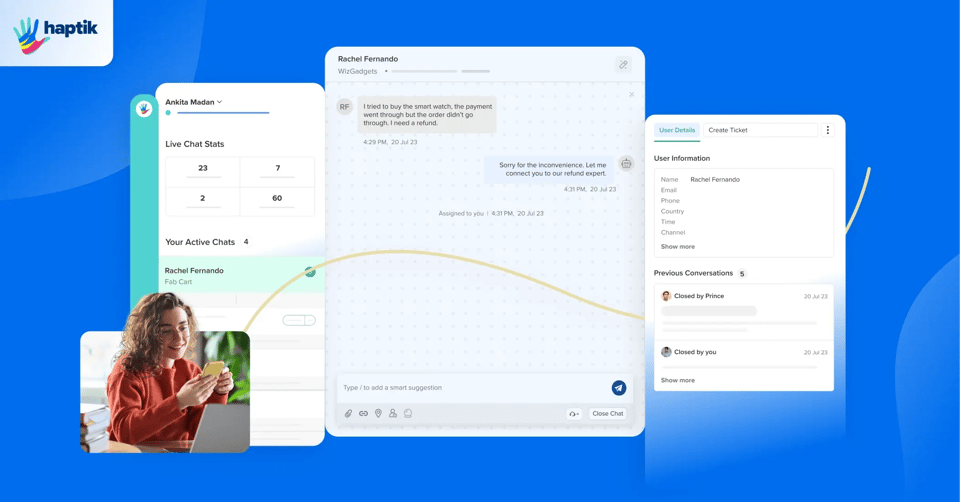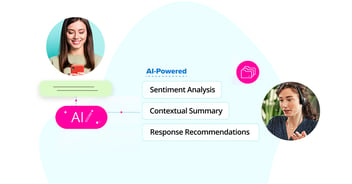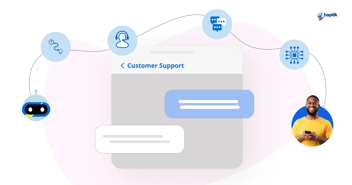Customer support software is the backbone of a company’s efforts to offer great customer service powered by AI agents and drive engagement. It provides the essential structure for delivering efficient, personalized, and data-driven support that improves the overall customer experience.
In this article, we’ll cover:
- Best customer support software
- What is customer support software?
- Benefits of customer support software
- Types of customer support software
- How to choose the right software
Best Customer Support Software
Contakt by Haptik
It’s a powerful, end-to-end customer experience suite whose core features are founded on Generative AI. The suite comprises:
- Gen AI assistant
- Agent assist
- Cutting-edge analytics
Gen AI Assistant: Businesses can use their unstructured data sources (PDFs, CSVs, blogs, webpages, etc.) to build an AI Assistant in almost no time, and enable customer self-service. It powers fast and efficient support during post- and pre-sales stages, including GPT-powered sales advisory to help customers make informed purchases. With little to no bot building and training time, businesses can train the AI Assistant with their knowledge base and help center resources to quickly resolve customer FAQs. For more complex queries, the bot initiates the handoff to a human agent.
Agent Assist: Also known as Smart Agent Chat, it boosts agent productivity. Agents can tap into AI-powered response suggestions, AI-powered chat summaries, and AI-powered tone enhancer to offer satisfactory and contextual query resolution for higher customer satisfaction. Agents can seamlessly collaborate within a contextual agent inbox to efficiently resolve queries.
Cutting-Edge Analytics: Named Intelligent Analytics, the feature allows you to track bot and agent performance KPIs in real-time, and optimize for higher efficiency. Moreover, businesses can create custom reports and dashboards to track metrics that truly matter, including average query handling time, average first-response time, average queue wait time, among others. It also provides AI recommendations for efficient resource allocation, and streamlines SLA management.
Here’s all you need to know about Contakt
Plans: Conversations & Agent-Based Pricing
Zendesk
Zendesk for customer service is a robust support platform catering to enterprises, SMBs, and startups - that improves efficiency and enables seamless business-customer interactions powered by AI. Zendesk integrates with Haptik to enable businesses to engage seamlessly with customers across channels. Zendesk offers automation capabilities, along with omnichannel support, and reporting and analytics.
Zendesk includes a ticketing system to manage customer support interactions, while offering various options for customization to deliver maximum value under each plan. It provides agent assist features, similar to Contakt, to facilitate seamless collaboration and fast and efficient support experience.
Plan: Zendesk follows an agent-based pricing plan, and includes a free product trial.
Freshdesk
It’s a cloud-based customer support software solution that allows businesses to effectively manage customer queries, support tickets, and conversations. It comes with two support offerings, one for omnichannel support and the other a helpdesk solution. Freshdesk allows businesses to engage with their customers on social media platforms, though its AI feature is available only to businesses opting for the omnichannel support tiers.
However, Freshdesk includes many key features necessary for enterprise support, including ticket routing, native integrations, automation, tracking and reporting, among others.
Plan: Freshdesk follows an agent-based pricing model, and has the option of free product trial.
Compare: Contact vs Freshworks Customer Service Suite
HubSpot
While being a powerful CRM, HubSpot also has customer service software named Service Hub, which brings together all customer service data and channels on one unified platform. This helps streamline support and drive customer delight.
Service Hub comprises live chat, shared inbox, reporting dashboards, and more. HubSpot’s products can integrate seamlessly with Service Hub, while agents can offer personalized service with the contextual data available to them.
Plan: HubSpot offers four service plans, including free, starter, professional, and enterprise.
Salesforce
Similar to HubSpot, Salesforce is best known for its Sales CRM, but it also offers a customer support platform called Service Cloud, particularly suitable for teams that offer support on Slack. Businesses can leverage Salesforce Service Cloud for email and live chat support and automation. The add-ons provided with Service Cloud, such as AI, can integrate with the Sales CRM to provide additional insights on customers.
Salesforce provides tools for call center management, including call routing and call scripting, and real-time analytics.
Plan: Salesforce Service Cloud offers four plans - Starter, Professional, Enterprise, and Unlimited
Zoho Desk
Zoho, while popular for its CRM, offers a powerful help desk software called Zoho Desk. It provides several key features including shared inbox, chat, and phone integration - although the chat feature is not available with all pricing plans.
Zoho Desk is an omnichannel customer support software that boosts agent productivity and delivers customer satisfaction. It provides native integrations with other Zoho products.
Plan: Zoho Desk offers three plans - Standard, Professional, and Enterprise. It comes with a free trial option.
Nice CXOne
It’s a cloud-based call center software that helps optimize the cost of client conversations, and improve the quality of leads. It offers various features necessary for businesses to support inbound requests on multiple channels like email, chat, social media, voice calls, and more. ACD, CTI & IVR are the call routing features offered by NICE CXOne.
It has the capability to integrate a majority of communication channels within a single agent interface.
Plan: Nice CXOne offers six contact center plans - Digital Agent, Voice Agent, Omnichannel Agent, Essential Suite, Core Suite, Complete Suite
What Is Customer Support Software?
It is a specialized tool for businesses to streamline and improve efficiency of customer support across channels. Customer support software (often used interchangeably with customer service software) comprises ticketing systems, knowledge bases, live chat support, automation, and analytics to enable support teams to track, prioritize, and resolve customer queries. Companies can improve response times, optimize support operations, and improve customer satisfaction (CSAT) with the right tool.
What are the Benefits of Customer Support Software?
From improved efficiency to higher customer satisfaction, software for customer support offers wide-ranging benefits for businesses of all sizes and across sectors.
Efficient Ticket Management: With the centralization of ticketing systems, customer queries are organized, prioritized, and assigned in a more efficient manner. This streamlines the support process and ensures each query/ticket is addressed promptly and by the right team member.
Real-Time Analytics & Reporting: A customer support software helps gather real-time insights into support team’s performance real-time analytics and reporting tools. The insights help in getting a pulse of customer experience, optimizing resources, and identifying areas of improvement. For example, Haptik’s cutting-edge analytics engine helps track bot and agent performance in real-time, and offers AI recommendations to improve the efficiency of the support system.
Agent Collaboration & Productivity: Support agents can leverage software’s capabilities to collaborate on customer-facing issues and fast-track resolution. Moreover, they can unlock more productivity by maximizing automated workflows and intelligent routing features to streamline the resolution of routine tasks and focus on more pressing concerns. An AI feature such as Agent Co-pilot boosts agent productivity with AI-powered response suggestions, chat summaries, and tone enhancer to improve customer experience and to smoothen agent-customer interactions.
Integration: Most customer support solutions integrate with other business systems such as a CRM. This facilitates seamless communication and data sharing, helping break down information silos. Thus, it enables easy access to customer profiles, histories, and preferences to deliver a more personalized service.
Scalability: Customer support software helps enterprises to scale with their growing needs. It retains the efficiency of support infrastructure even as the volume of customer queries and workloads increase over time. Enterprises could even integrate with new communication channels, optimize workflows, and adopt emerging technologies with a scalable support software.
Types of Customer Support Software
Support software can come in both forms: those that support the internal stakeholders at a company, or provide support to people or brands who procure products and services. Let’s look at the main types of customer support software.
Contact Center
Contact center or call center software can transform the way you handle customer communications. From omnichannel support to call routing to interactive voice response (IVR) - it unlocks higher efficiency, which in turn helps optimize resources. Average call lengths, customer sentiment during interactions, and agent performance can be seamlessly tracked with a contact center software.
Live Chat
Live chat software, including voice bots, facilitates real-time communication between businesses and their customers. The combination of text & voice-based interactions streamline customer service, increase CSAT through personalized interactions, help engage proactively and resolve issues beforehand, and save costs. Voice bots allow customers to engage in human-like conversations, cater to a diverse audience base, and unify customer experience.
A live chat support software offers omnichannel support, chat routing and queue management, canned responses for agents to resolve FAQs efficiently, CRM integration, and more.
Help Desk
Help desk software is a comprehensive platform that streamlines customer support operations. It includes a ticketing system to efficiently manage the resolution of customer issues through ticket organization. It empowers seamless agent collaboration, allows for efficient automation of routine queries and FAQs, and can be integrated with the knowledge base.
It promotes effortless management of SLAs, with businesses able to set response and resolution time expectations to ensure support goals are met. Reporting and analytics are also a big part of help desk software, providing insights into team performance, ticket resolution time, customer satisfaction scores, and other KPIs.
Knowledge Base
It’s a type of software that allows the creation of articles, documents, FAQs, and other support content to drive customer self-service. On the other hand, an internal knowledge base ensures the content is private and accessible to only authorized users, who typically need to log in to access the information.
With a knowledge base software, companies can maintain the consistency of information as content stays standardized and updated regularly. With customers getting quick access to accurate information, there’s scope for higher customer satisfaction and overall better customer experience.
Messaging Apps
Channels like WhatsApp, Instagram, and mobile apps have helped businesses boost customer engagement, streamline support, and meet customers where they are. Most messaging apps integrate seamlessly with conversational solutions like chatbots to automate support and allow agents to focus on complex tasks.
Businesses can interact in a more personalized manner with customers on channels like WhatsApp - driving acquisition, engagement, sales, and phenomenal post-purchase support.
RELATED: List of Top 10 WhatsApp Business Solution Providers
How to Choose the Right Customer Support Software
The choice of software comes down to a variety of factors, although it’s paramount for businesses to implement the right software to make customer support more efficient and ensure a seamless customer experience.
Scalability
The right customer support solution is one that can scale with your business. This means it can help you handle a rising volume of customer interactions, while maintaining efficiency and responsiveness. A scalable software can seamlessly integrate with new systems, provide flexibility in managing workflows, and ensure your support team has fewer disruptions.
Personalization
Customers want their issues resolved fast and efficiently. But equally, they want their concerns addressed individually, making them feel heard and important. A support software that stores and provides easy access to customer information (order history, past conversations, and the like) empowers support teams to provide personalized support. It means customers don’t have the need to repeat themselves and receive relevant support each time. Personalization, if done right, translates to better customer experience, retention, and repeat business.
AI-Powered Self-Service
According to data from a research, 73% of customers say that they want to be able to solve their problems independently. With AI-powered conversational solutions like chatbots, customer support becomes more streamlined and efficient. AI, integrated with knowledge bases and help center articles, fast-tracks resolution and reduces dependency on the support team. Self-service isn’t limited to post-sales queries either; with the advent of large language models (LLMs) such as Generative AI, businesses can offer conversational purchase guidance to help customers make informed purchases, elevating customer experience and boosting retention.
Integrations
The customer support software you choose must have integrations with the tools you use. These could be any third-party applications - like an eCommerce platform, for example, that allows you to access and manage product returns and refunds directly within the support software. A customer support tool with the necessary integrations will also improve the team’s productivity and minimize or eliminate the need for external tools.
Reporting & Analytics
Access to accurate data insights is key to enhancing sales, marketing, and support processes in any business. For example, if your system indicates high agent dependency and a low CSAT score, it could be that the self-service options are either not adequate or functioning as efficiently as necessary. Thus, analytics can help identify and address gaps in your system for better efficiency and customer experience.
Conclusion
As the customer support landscape continues to evolve, the importance of a robust support software is increasingly apparent. With the right customer support tool, businesses can not only streamline operations but drive higher customer satisfaction and boost loyalty and repeat business. With features ranging from self-service capabilities to integration ecosystem and reporting and analytics, it’s necessary for businesses to choose the right software that aligns with their specific needs and business goals.
Interested to explore more or want to try out a chatbot of your own?







.png?width=352&name=Linkedin+%20Twitter%20(3).png)
.png?quality=low&width=352&name=LinkedIn%20(3).png)
